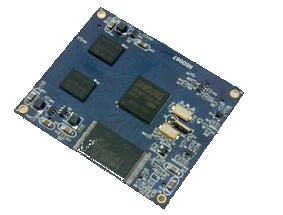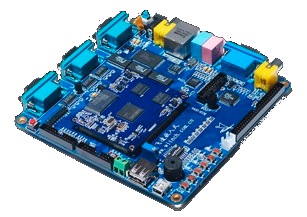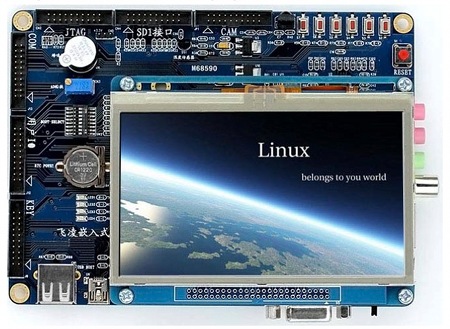ARM11 dev kit supports Linux, Android
Jun 14, 2010 — by LinuxDevices Staff — from the LinuxDevices Archive — 10 viewsWitech Ltd. announced a low-cost ARM11 SOM (system on module), bundled with a development kit that includes a 4.3-inch display. The TE6410 and OK6410 feature a 667MHz Samsung S3C6410 processor, 128MB of RAM and 256MB of flash storage, USB host/slave ports, an SD slot, plus support for available Wi-Fi, camera, GPS, and GPRS modules.
Chinese embedded device manufacturer Witech touts the low cost of its TE6410/OK6410 combo, noting that demo BSPs (board support packages) are available for Linux, Android, and Windows CE. "Such demos should be quite helpful in shortening customers' development circles and reducing their time to market, the company says."
 The TE6410 (right) is a SOM that includes a Samsung S3C6410 processor clocked at 667MHz. Featuring an ARM1176-based core, the processor adds what Samsung refers to as "advanced hardware blocks for multimedia processing." A hardwired Multi Format Codec (MFC) unit allows the S3C6410 to perform video capturing in MPEG4/H.263/H.264 formats, and play back video in MPEG4/H.263/H.264/VC1 formats, while still delivering long battery life, Samsung says.
The TE6410 (right) is a SOM that includes a Samsung S3C6410 processor clocked at 667MHz. Featuring an ARM1176-based core, the processor adds what Samsung refers to as "advanced hardware blocks for multimedia processing." A hardwired Multi Format Codec (MFC) unit allows the S3C6410 to perform video capturing in MPEG4/H.263/H.264 formats, and play back video in MPEG4/H.263/H.264/VC1 formats, while still delivering long battery life, Samsung says.
The SC36410 is said to deliver standard-definition (SD) quality video capturing and playback at 30fps, as well as support two-way real-time video conferencing. In addition, the embedded hardware encoder/decoder includes TV out capability in both the NTSC and PAL formats.
 Witech says the TE6410 also includes 128MB of RAM and 256MB of NAND flash storage, but adds no further details about the SOM itself. The 2.36 x 1.96-inch (60 x 50mm) module is obviously intended for use with the company's own OK6410 baseboard (right), sending all of its signals through one or more dedicated connectors.
Witech says the TE6410 also includes 128MB of RAM and 256MB of NAND flash storage, but adds no further details about the SOM itself. The 2.36 x 1.96-inch (60 x 50mm) module is obviously intended for use with the company's own OK6410 baseboard (right), sending all of its signals through one or more dedicated connectors.
According to Witech, the OK6410 not only houses and powers the TE6410, but also has three expansion interfaces with a total of 60 pins. These interfaces may be used to connect an 8 x 8 keypad, among other things, and the board supports touchscreen displays ranging from 3.5 to 10 inches in size, the company says.
PC-style ports on the OK6410 include four serial ports, a 10/100 Ethernet port, a USB 1.1 host interface, and a USB 2.0 device interface, the company says. The board also includes a high-speed SD slot, stereo audio I/O, a JTAG interface, and a NTSC/PAL composite video output, Witech adds.

Witech's OK6410 development kit
(Click to enlarge)
According to Witech, the OK6410 also includes connectors allowing the addition of Wi-Fi, a CMOS camera, and a GPRS cellular modem. As noted, a variety of screen sizes are supported, but the board is sold as the "OK6410 development kit" with the 4.3-inch screen pictured above.
Features and specifications listed by Witech for its TE6410 SOM and OK6410 baseboard include:
- Processor — Samsung S3C6410 clocked at 667MHz
- Memory — 128MB of RAM and 256MB of NAND flash storage
- Displays — supports LCDs and touchscreens ranging from 3.5 to 10 inches
- Networking — 10/100 Ethernet (Wi-Fi and GPRS optionally available)
- Expansion:
- SD slot
- 1 x GND
- 1 x DA
- 8 x AD
- 10 x IO
- 1 x SPI
- camera connector
- Other I/O:
- 4 x serial (1 x 5-wire RS232, 3 x 3-wire RS232)
- 1 x USB 1.1 host
- 1 x USB 2.0 device
- composite video out (PAL/NTSC)
- JTAG
- IR receiver
- stereo audio I/O
- Operating range — n/s
- Power requirements — n/s
- Dimensions:
- module — 2.36 x 1.96-inch (60 x 50mm)
- baseboard — n/s
Availability
The TE6410 and OK6410 appear to be available now. The module costs approximately $120, while the OK6410 development kit (baseboard and 4.3-inch LCD) costs approximately $140.
More information may be found on the company's website, here.
This article was originally published on LinuxDevices.com and has been donated to the open source community by QuinStreet Inc. Please visit LinuxToday.com for up-to-date news and articles about Linux and open source.